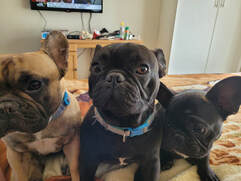|
You should always do your 'homework' to find out all you can about your chosen breed, however, if you choose a cross breed, all you have is a guess as to what breeds it is made up of. By doing a simple DNA test, in the comfort of your own home, you can find out exactly what breeds your cross is made up of, and then do your 'homework' to the genetics, health issues, what exercise and stimulation suits them best, and also any behaviour quirks they may be predisposed too. Do contact us at www.muttmix.co.za to see how easy this is.
|
The importance of knowing the breed BEFORE you choose your puppy
Guest Contributor - Kay Aitcheson
www.puppiesinbalance.co.za
Niki and Kay run Puppies in Balance Puppy School in Bryanston/Sandton and Bloubosrand in the Cape are one of our recommended puppy schools.
www.puppiesinbalance.co.za
Niki and Kay run Puppies in Balance Puppy School in Bryanston/Sandton and Bloubosrand in the Cape are one of our recommended puppy schools.
.

So you want to get a puppy … it’s such an exciting and fun time, but which one should you get?
I can’t stress enough the importance of doing thorough research into the different dog breeds before selecting your puppy. The variety is enormous and it is important to choose carefully according to your interests, your lifestyle and current and future circumstances. Some dogs require more grooming than others or even professional grooming. Some dogs may be little, but require a lot of exercise like a Jack Russell Terrier, others are going to grow into large, heavy dogs that eat huge amounts of food like a Boerboel and yet others are going to stay small, like a Yorkshire Terrier.
You need to give careful consideration to how the new puppy is going to fit into your lifestyle. Bearing in mind also, that he isn’t always going to be little … and in all likelihood he’s going to be around for a good 10 years.
These are the types of questions you should consider when looking for a puppy:
These are but a few of the questions that should be carefully considered when you decide to acquire a new puppy. Too often, I have encountered someone that didn’t realize their puppy would grow so big, or be so active … “I just can’t handle him” they say.
Please, do yourself and your puppy a favour, read up … be informed.
A little bit of “homework” at the outset could go a long way towards a happy and loving relationship! You owe it to your new puppy to know something about his breed, his nature and his specific needs. Remember, this is a life we’re talking about, … he’s a person too!
Please, read up and make an informed decision.
(Do have a look at both our Breed Section and if you have another dog see if the new dog will be compatible by researching our Breed Compatibility Section.
I can’t stress enough the importance of doing thorough research into the different dog breeds before selecting your puppy. The variety is enormous and it is important to choose carefully according to your interests, your lifestyle and current and future circumstances. Some dogs require more grooming than others or even professional grooming. Some dogs may be little, but require a lot of exercise like a Jack Russell Terrier, others are going to grow into large, heavy dogs that eat huge amounts of food like a Boerboel and yet others are going to stay small, like a Yorkshire Terrier.
You need to give careful consideration to how the new puppy is going to fit into your lifestyle. Bearing in mind also, that he isn’t always going to be little … and in all likelihood he’s going to be around for a good 10 years.
These are the types of questions you should consider when looking for a puppy:
- Consider all attributes of the adult size dog, and not just it’s size at 8 weeks of age. An adult Mastiff for example, will lose some of his puppy appeal.
- How much attention will his coat require? A long haired Chow Chow’s coat needs vast amounts of grooming while a Labrador’s needs less.
- Will your puppy shed his hair regularly? If you’re very house proud or suffer from allergies, a Poodle with a non-shedding coat might suite you.
- How much exercise will he need? Small dogs such as terriers require more exercise, more often than do large dogs like a St Bernard or Irish Wolf Hound.
- Does he require long daily walks? Will you have the time to take him out regularly?
- How easy is he to train?
- Do you have the time to take him to puppy school? Particularly the larger breeds, are much more of a pleasure if they know how to behave, in the house, around visitors, with children, etc.
- How big is he going to get? Newfoundland puppies are adorable, but they grow into large, heavy dogs.
- Is he suited to town house living or does he require a large garden? Small dogs invariably need as much exercise as larger dogs, but can get their exercise in more confined locations.
- Is the breed renowned for being good with children?
- Do you have a manicured garden that is likely to be chewed up or dug up, or both? Labrador puppies have a long chewing and digging phase.
- Do you have other animals and is your puppy likely to get on with them, or they with him?
- What about the inherited diseases that many of the pure-bred dogs are prone to? Will you be in a position to carry the resultant vet bills?
These are but a few of the questions that should be carefully considered when you decide to acquire a new puppy. Too often, I have encountered someone that didn’t realize their puppy would grow so big, or be so active … “I just can’t handle him” they say.
Please, do yourself and your puppy a favour, read up … be informed.
A little bit of “homework” at the outset could go a long way towards a happy and loving relationship! You owe it to your new puppy to know something about his breed, his nature and his specific needs. Remember, this is a life we’re talking about, … he’s a person too!
Please, read up and make an informed decision.
(Do have a look at both our Breed Section and if you have another dog see if the new dog will be compatible by researching our Breed Compatibility Section.





